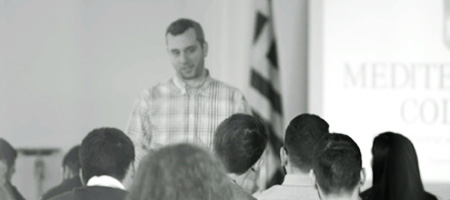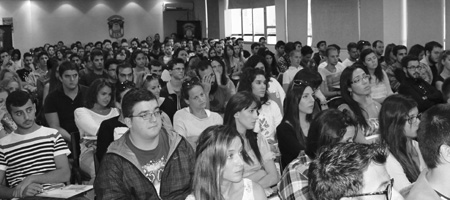
BSc (Hons) Speech Pathology & Therapy
- Bachelor degree in Speech Pathology & Therapy awarded by Manchester Metropolitan University, *8th in the UK for Aural/ Oral Sciences.
- Graduates are eligible to apply for registration with the Health Care Profession Council (HCPC).
- Meets the requirements for attaining the practitioner’s status in Greece, via SAEP of the Ministry of Education.
- Delivery in the Greek and the English language, with incorporated English language modules to ensure a smooth transition for students.
- Approximately 700 hours of practice placements in clinical and educational settings.
- Modern facilities: speech analysis labs, clinical assessment & counselling suites, early years workshops.
- Guest lectures by visiting practitioners and seminars on contemporary therapeutic approaches (e.g. dysphagia, acquired neurological disorders).
Course Information
The programme has been designed by the Manchester Metropolitan University (MMU), according to the criteria set by the British Health and Care Professional Council (HCPC) and the Royal College of Speech & Language Therapists (RCSLT), based on which the Speech Therapy academic programmes are accredited. Its aim is to prepare students to practice the speech therapy profession, which is concerned with the management of disorders of language, speech, fluency, voice, communication and swallowing in children and adults. The role of a speech and language therapist is to identify problems and work with the client to optimise communication. The programme places special emphasis on independent learning and on combining theoretical knowledge with practical application. It includes a compulsory practice placement of approximately 700 hours, both in educational and clinical contexts.
The programme is addressed to High School graduates who wish to follow a career as Speech and Language Therapists.
Entry requirements
- High School leaving certificate (Apolyterion) from a General or Vocational Senior High School (or equivalent)
- Reference Letter (1)
- Average knowledge of English (IELTS 4.0 or equivalent)
- Academic Interview
- Photos (2)
- Copy of ID-Card/ passport
- Health certificate
- Copy of criminal record
Candidates without official English language certificates can sit the English language placement test of Mediterranean College.
This is a 4-year programme, with the first two years being taught and assessed in Greek and the remaining two being taught and assessed in English (except for clinical practice and phonology & phonetics modules that are taught and assessed in Greek). The programme consists of 30 and 60 credit modules. A substantial part of the curriculum (approximately 700 hours) is delivered an assessed on professional practice in various clinical and educational contexts, both for children and adults. The following table presents the course outline:
| Year 1 | Year 2 | Year 3 | Year 4 |
| Foundations in Human Sciences | Applications of Clinical Theory 1 | Applications of Clinical Theory 2 | Complex Developmental and Neurological Conditions |
| Foundations in Language Acquisition and Development | Clinical Education 1 | Clinical Education 2 | Clinical Education 3 |
| English for Health Professionals 1 | Foundations of communication 1 | Foundations of Communication 2 | Acquired Communication and Swallowing Disorders |
| Scholarship for Health Professionals | Investigating Human Development and Behaviour 1 | Investigating Human Development and Behaviour 2 | Investigating Human Development and Behaviour 3 |
| English for Health Professionals 2 |
The programme employs diverse teaching, learning and assessment methods that are student friendly in nature and may enhance every student’s learning, irrespective of their learning profile: lectures, seminars, role playing, case studies, demonstrations, lab exercises, research etc. Students are assessed through written exams, literature review essays, group work, oral presentations, research projects, etc.
Practical teaching sessions take place in specialist rooms, workshops and labs, including:
- A modern video observation room with a one-way mirror and recording capability, where students can do role plays and therapy simulations, or conduct experiments.
- A clinical suite stocked with therapeutic and educational material, along with disorder assessment and diagnostic tools for children and adults. Students can access or borrow this material, familiarise themselves with it or use it in their clinical practice.
- A Speech Analysis computer lab with software and hardware for speech disorder assessment and restoration, essential to the speech therapy professional.
- An Early Years workshop, where students can create their own assessment material for children.
Students may use these facilities independently, for their own practical training and placement preparation.
Essential part of the course is delivered and assessed on practice placement, by registered speech therapists, who have been trained by Manchester Metropolitan University to undertake the clinical educator’s role. While on placement, students are supported by the College’s clinical coordinator and specialist staff team, so as to achieve all learning outcomes.
The learning experience is further enhanced by activities organised by the School of Health Professions.
- The Manchester Metropolitan University, according to Complete University Guide league tables, is ranked 8th in the UK in aural and oral sciences.
- The programme is bilingual: taught in Greek during the first two years and in English in the last two years, so that students are gradually and smoothly introduced to studying in English. English lessons are provided during the 1st and 2nd year of study, specially designed to cover terminology and to help students meet the requirements of the English-taught part of the programme (students therefore do not need additional English tuition). Students receive the support of the College’s English Department throughout their studies. As graduates of a UK University (being taught in English) they certify their English as a foreign language competence at a Proficiency (C2).
- It includes mandatory clinical placement (of approximately 700 hours) in a network of collaborating clinical and educational settings, under the supervision of experienced practitioners (clinical educators), who have been trained according to the regulations and requirements of Manchester Metropolitan University.
- Students’ practical skills are developed in the College’s fully equipped specialist rooms and labs, including video observation rooms with a one-way mirror, speech analysis computer labs and Early Years workshops.
- Teaching and learning is achieved in a variety of ways: practical lab sessions, role-plays, guest lectures from experienced healthcare professionals, poster presentations, research projects, supervision, case-studies etc. The programme’s emphasis on research benefits students, not only in the prospect of post-graduate studies but also, in relation to their future professional development.
- Mediterranean College gives particular emphasis on the academic support of undergraduate students: a personal tutor is assigned to every student; lecturers are available at office hours; students with difficulties may use the services of the counselling and learning support centre; students receive regular feedback on their academic progress; students have full access to the College’s libraries and electronic resources.
- All academic staff have a recognised teaching status of Manchester Metropolitan University for every module they teach. Mediterranean College implements an integrated system of recruitment, assessment and continuing professional development of academic staff, so that students receive excellent teaching and personal support to develop their social and professional skills.
- Speech Therapy students actively participate in activities organised within the MC Employability Scheme, the College’s integrative employability development plan, which prepares them to be competitive in the demanding labour market.
Graduates of the programme, according to the Greek law, are holders of an accredited university degree, professionally equivalent to those awarded by Greek State Higher Education Institutions. If they wish so, they can have their degree recognised by the Greek authorities. Click here for more information on the degree recognition procedure.
Upon completion of the programme, graduates have the opportunity to continue their studies at post-graduate level or start their professional career as speech and language therapists.
The Mediterranean College Master’s programmes they may attend:
- MA Education: Special Educational Needs and Disability
- MA Education: Leadership and Management
- MSc Integrative Counseling and Psychotherapy
Alternatively, the can complete a CPD course at Mediterranean Professional Studies in one of the following related fields:
- Acquired Neurological Disorders
- Clinical Dysphagia
- Applications of Special Education Today
By successfully completing the course graduates may work in:
- Private hospitals and clinics
- The National Health System
- Daycare centres for children with special needs (autism, Down syndrome, mental retardation etc.)
- Board schools for people with special needs
- Rehabilitation centres for children and adults
- Clinics specialising in the rehabilitation of speech, communication or swallowing disorders in children and adults
- Schools for the deaf – people with hearing impairment
- Special education centres and special schools
- Kindergartens and schools
- Counseling centres
Or be self-employed speech therapists with private practice.
Testimonials
I truly loved attending the classes for the Health Management programme. The courses were really interesting and the teachers made great effort to transmit their knowledge, which I honestly appreciate. Last but not least, my fellow students made last year more enjoyable and fun with their presence during classes! Thank you everyone for the great experience!...
Igodaro Victor, Executive Diploma in Health Care Management
In the Physiotherapy department of Mediterranean College we connect what we learn in theory into practice, through workshops and practical courseworks. From the second year and beyond, every year, the programme content includes clinical practice. All this, combined with our teachers who help us, support us and are experienced in what they teach, makes me feel confident about my skills as a physiotherapist....
Efitichia Proniou, BSc (Hons) Physiotherapy
The vast experience of Mediterranean College, along with the name of a renowned British university, the Manchester Metropolitan University, were essential selection criteria of this studies programme. The College’s learning facilities are robust and they organise too many education activities to enrich our knowledge. We look forward to starting our clinical practice in the College’s cooperating hospitals and rehabilitation centers....
Apostolis Kaliakoudas, BSc (Hons) Physiotherapy



